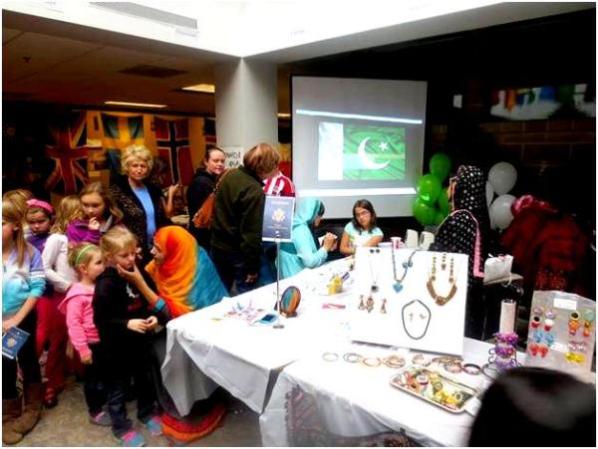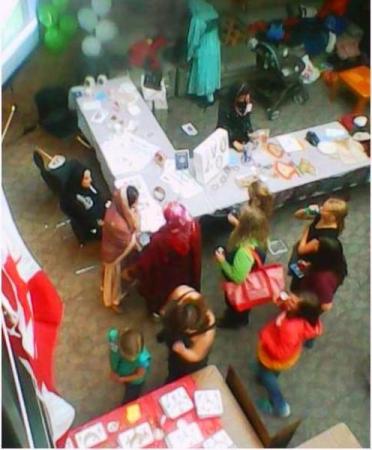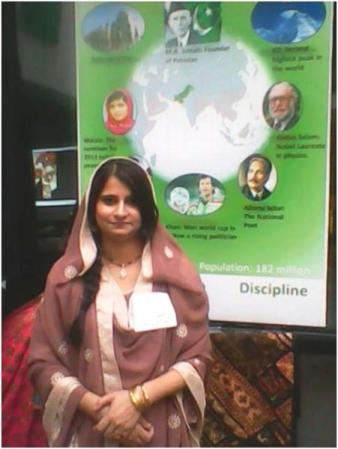
Pangea, Cultivate our Cultures event: Uplifting Pakistan's image in the US
We played Jeeway Jeeway Pakistan at the event and were thrilled to see American ladies dance to the tune!
Martin Scorsese, an American film director, screenwriter, producer, actor and film historian once rightly said,
“People have to start talking to know more about other cultures and to understand each other.”
The ethnic diversity of Fargo-Moorhead, in Minnesota, USA is rapidly increasing with the influx of people from different countries and cultures. For the last couple of years, the area has been home to a festival called the Pangea – Cultivate Our Cultures (PCOC) held regularly in order to bring together different communities in Fargo-Moorhead and provide them with a forum to represent their respective cultures.
Although there are a number of Pakistanis living in Fargo, we had never participated in the festival until now. On November 9, 2013 a small group of Pakistani females represented Pakistan for the first time in the PCOC event held at the Hjemkomst Center, Moorhead in Minnesota.
Having lived and interacted with people in the US for some time, we had come to realise that most people were unaware of our rich culture and history. The little they did know was limited to thinking that people from Pakistan are ultra-conservative and have no culture of their own.
We thought that this would be the perfect opportunity to create more awareness about our culture amongst the people we live in. This year, Mrs Mehreen Samee came up with the idea that we should have a Pakistani stall at the event. She is a very active Pakistani community member in Fargo and is married to Dr Samee U Khan, who works at North Dakota State University (NDSU) and happens to be a known Pakistani-born scientist.
We experienced a mix of emotions as we started preparing for our participation in the event. We were really nervous since we were organising a stall for the first time but at the same time there was a sense of excitement and pride since we were to represent our country, culture and people. We hoped that all would go well and that we would be able to manage everything properly.
We were afraid that our stall and display might appear to be too simple compared to the stalls of other countries since it was our first attempt and many others had been participating in the event for a number of years.
 We displayed traditional Pakistani jewellery and clothes at our stall and offered henna application and face painting. Photo: Sania Usman
We displayed traditional Pakistani jewellery and clothes at our stall and offered henna application and face painting. Photo: Sania UsmanWe displayed our personal jewellery and dresses at the exhibition in order to paint a picture of our culture for the guests. Apart from this, we offered henna application, face painting and writing names of the guests in Urdu on cards.
The response from the people attending the event simply bowled us over.
Our stall soon became the most crowded stall in the event. Ladies, children and even some men were fascinated by the henna application and were eager to have us paint beautiful designs on their hands. Many inquisitive ladies asked us,
“Why do you apply henna on your hands? And when do you normally apply it? Is it for special occasions?”
We tried to explain it to them as simply as possible,
“We apply henna when we are happy and celebrating something. We usually apply it when someone is getting married, on Eid which is our biannual festival and on Christmas.”
 The women and children enjoyed face painting and henna application. Photo: Sania Usman
The women and children enjoyed face painting and henna application. Photo: Sania UsmanSince we did not know what response we would receive at the event, we had kept our personal items like jewellery and clothes for display only and not for sale. But the visitors loved all our traditional attire and accessories and were eager to purchase them. We were very sad that we were not able to sell any of these things but this experience taught us that there is a potential market in the US for our embroidered clothes, dupattas and accessories. My son’s tiny, embroidered sherwani attracted many visitors and became the central display at our stall.
 My son's tiny sherwani became the centre of attention at our stall. Photo: Sania Usman
My son's tiny sherwani became the centre of attention at our stall. Photo: Sania UsmanWe were asked many questions by the people who visited our display and it was exhilarating to see how curious these people were about our culture and how unaware of our customs!
Many children at the event asked us why all us ladies had our heads covered. We explained to them that we were attired in our traditional dress and that the dupatta was a part of our dress. A French family wanted to know,
“Do you people wear burqas in Pakistan? Do all women wear burqas in Pakistan?”
We replied,
“No, not every woman wears a burqa in Pakistan. Some do, while others do not.”
We were glad that we were able to clear some misconceptions about Pakistan and were able to at least change the image of our country in the minds of a few people in Fargo-Moorhead. It felt like a positive step, no matter how small it was.
 Our display soon attracted the most visitors at the Pangea - Cultivate Our Cultures event. Photo: Sania Usman
Our display soon attracted the most visitors at the Pangea - Cultivate Our Cultures event. Photo: Sania UsmanWe had also displayed a poster of Malala at our stall. People flocked to her picture and said that they had seen her on TV. We told them her story of bravery and her struggle for the education of girls in Pakistan.
 Malala's poster attracted many people to our display. Photo: Sania Usman
Malala's poster attracted many people to our display. Photo: Sania UsmanWe had put up a multimedia slideshow depicting the beautiful mountains and valleys of Pakistan’s northern areas with our national songs playing in the background such as Jeway Jeway Pakistan and Nusrat Fateh Ali Khan’s Pakistan Pakistan. People were very surprised to see the majestic beauty of our country in these photographs. And although we kept the volume of the songs quite low so as not to cause a disturbance, we were thrilled when a few ladies came and told us that they liked the songs and even did a little dance right there!
Interestingly none of the other stalls used multimedia for their display and this gave our display an additional edge and attracted more people to our booth.
The event was covered by Fox News channel and we were ecstatic to see our stall in the news segment.
All in all, it was a very rewarding and encouraging event for us. Our success put all our fears to rest and we are all very happy to have taken this opportunity to show our country in a new light to the people of Fargo-Moorhead, USA.
It is imperative for the Pakistani community all over the world to participate in events like these so that the misconceptions that non-Pakistanis hold in their minds about Pakistan and its people can be replaced with a happier, more positive aspect of our country.
This is the least that we can all do for our beloved nation.

COMMENTS (23)
Comments are moderated and generally will be posted if they are on-topic and not abusive.
For more information, please see our Comments FAQ